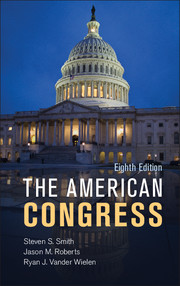Book contents
- Frontmatter
- Contents
- PREFACE
- Acknowledgments
- 1 The Troubled Congress
- 2 Representation and Lawmaking in Congress
- 3 Congressional Elections and Policy Alignments
- 4 Members, Goals, Resources, and Strategies
- 5 Parties and Leaders
- 6 The Standing Committees
- 7 The Rules of the Legislative Game
- 8 The Floor and Voting
- 9 Congress and the President
- 10 Congress and the Courts
- 11 Congress, Lobbyists, and Interest Groups
- 12 Congress and Budget Politics
- Appendix Introduction to the Spatial Theory of Legislating
- Index
- References
1 - The Troubled Congress
- Frontmatter
- Contents
- PREFACE
- Acknowledgments
- 1 The Troubled Congress
- 2 Representation and Lawmaking in Congress
- 3 Congressional Elections and Policy Alignments
- 4 Members, Goals, Resources, and Strategies
- 5 Parties and Leaders
- 6 The Standing Committees
- 7 The Rules of the Legislative Game
- 8 The Floor and Voting
- 9 Congress and the President
- 10 Congress and the Courts
- 11 Congress, Lobbyists, and Interest Groups
- 12 Congress and Budget Politics
- Appendix Introduction to the Spatial Theory of Legislating
- Index
- References
Summary
For most Americans today, Congress is our most frustrating political institution. Legislation is the product of a process marked by controversy, frequent delay, partisanship, and bargaining. Even some members of Congress are uncomfortable with the sharp rhetoric and wheeling and dealing that are hallmarks of legislative politics. They are among the most severe critics of the institution.
Nevertheless, Congress is important to understand. No other national legislature has greater power than the Congress of the United States. Its daily actions affect the lives of all Americans and many people around the world. It checks the exercise of power by the president, the courts, and the bureaucracy. If you want to understand the forces influencing your well being, you must understand Congress.
Congress is not easy to understand. Its sheer size – 535 members and more than 25,000 employees – is bewildering. Its system of parties, leaders, committees, and procedures, built up over 200 years, is remarkably complex and serves as an obstacle to public understanding.
Congress is always changing. It changes because it is a remarkably permeable institution. New problems, whatever their source, invariably create new demands on Congress. Elections bring new members who often alter the balance of opinion in the House and Senate. Elections also frequently bring a change in majority party control of Congress, which leads to a transfer of agenda control on the floor and in committees from one party to another. In addition, each new president asks for support for his policy program. Members of Congress often respond to these demands by passing new legislation. However, as lawmakers pursue their personal political goals, compete with one another for control over policy, and react to pressure from presidents, their constituents, and lobbyists, they sometimes seek to gain advantage or to remove impediments to action by altering the procedures and organization of Congress itself. The result is nearly continuous change within the institution.
- Type
- Chapter
- Information
- The American Congress , pp. 1 - 30Publisher: Cambridge University PressPrint publication year: 2013



